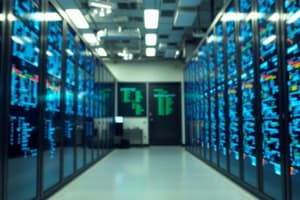Podcast
Questions and Answers
What is the primary objective of a system?
What is the primary objective of a system?
- To provide feedback to users
- To attain a specific goal or set of goals (correct)
- To collect and store data
- To reduce costs and increase revenues
Which of the following is NOT a characteristic of valuable information?
Which of the following is NOT a characteristic of valuable information?
- Accuracy
- Timeliness
- Completeness
- Relevance (correct)
What is the primary difference between data and information?
What is the primary difference between data and information?
- Data is used for analysis, while information is used for decision-making
- Data is organized facts, while information is raw facts
- Data is raw facts, while information is organized facts (correct)
- Data is used for decision-making, while information is used for analysis
What is the term for the awareness and understanding of a set of information?
What is the term for the awareness and understanding of a set of information?
What is the primary goal of an information system?
What is the primary goal of an information system?
What is the term for a set of interrelated components that collect, manipulate, and disseminate data and information and provide feedback to meet an objective?
What is the term for a set of interrelated components that collect, manipulate, and disseminate data and information and provide feedback to meet an objective?
What is the term for the measure of the extent to which a system attains its goals?
What is the term for the measure of the extent to which a system attains its goals?
What is the term for the specific objective of a system?
What is the term for the specific objective of a system?
What is the term for the measure of what is produced divided by what is consumed?
What is the term for the measure of what is produced divided by what is consumed?
What is the term for a set of elements or components that interact to accomplish goals?
What is the term for a set of elements or components that interact to accomplish goals?
Flashcards are hidden until you start studying
Study Notes
Information Systems
- An information system (IS) is a set of interrelated elements that collect, manipulate, store, disseminate data and information, and provide feedback to meet an objective.
- IS includes input, processing, output, and feedback components.
Manual and Computerized Information Systems
- Information systems can be manual or computerized.
- Manual systems: use manual methods to collect, process, and store data, such as investment analysts manually drawing charts and trend lines.
- Computerized systems: use computers and software to collect, process, and store data, such as systems that follow stock indexes and markets to suggest when to buy or sell stocks.
Computer-Based Information Systems
- A computer-based information system (CBIS) consists of a single set of hardware, software, databases, telecommunications, people, and procedures.
- CBIS is configured to collect, manipulate, store, and process data into information.
Computer-Based Information Systems Components
- Hardware: includes computer equipment used for input, processing, and output activities.
- Software: includes computer programs that govern the operation of the computer.
- Database: an organized collection of facts and information, typically consisting of two or more related data files.
- Telecommunications and networks: enables electronic communication between computers and equipment.
- People: the most important element in most computer-based information systems.
- Procedures: include strategies, policies, methods, and rules for using the CBIS.
Business Information Systems
- Common types of business information systems:
- Electronic and mobile commerce
- Transaction processing systems
- Management information systems
- Decision support systems
- Special-purpose systems: used by some organizations, such as virtual reality systems.
Electronic and Mobile Commerce
- E-commerce: any business transaction executed electronically between companies, consumers, and the public sector.
- Mobile commerce (m-commerce): the use of mobile, wireless devices to place orders and conduct business.
- Electronic business (e-business): uses information systems and the Internet to perform all business-related tasks and functions.
Transaction Processing Systems
- Transaction: any business-related exchange, such as payments to employees and sales to customers.
- Transaction processing system (TPS): an organized collection of people, procedures, software, databases, and devices used to record completed business transactions.
- Enterprise resource planning: a set of integrated programs that manage vital business operations for an entire organization.
Information and Decision Support Systems
- Management information system (MIS): provides routine information to managers and decision makers.
- Decision support system (DSS): supports problem-specific decision making, used when information needed to determine action is difficult to obtain.
Specialized Business Information Systems
- Knowledge management systems (KMSs): create, store, share, and use the organization's knowledge and experience.
- Artificial intelligence (AI): gives computers the ability to think and act like humans.
- Expert systems: provide the ability to make suggestions and function like an expert in a particular field.
- Virtual reality: simulates a real or imagined environment that can be experienced visually in three dimensions.
Systems Development
- Systems development: the activity of creating or modifying existing business systems.
- Outsourcing: allows a company to focus on its core business and delegate other functions to companies with expertise in systems development.
Systems Investigation and Analysis
- Systems investigation: gains a clear understanding of the problem to be solved or opportunity to be addressed.
- Systems analysis: defines the problems and opportunities of the existing system.
Systems Design, Implementation, and Maintenance
- Systems design: determines how the new system will work to meet business needs.
- Systems implementation: acquires and assembles system components, and puts the new system into operation.
- Systems maintenance and review: checks and modifies the system to ensure it continues to meet changing business needs.
Information Systems in Society, Business, and Industry
- Information systems have been developed to meet the needs of all types of organizations and people.
- Information systems have the potential to improve the way organizations conduct business.
Security, Privacy, and Ethical Issues
- Drawbacks of information systems:
- Personal data can be lost or stolen.
- Raises work concerns, including job loss through increased efficiency.
- To protect against threats:
- Install security and control measures.
- Use of information systems raises ethical issues.
Computer and Information Systems Literacy
- Computer literacy: knowledge of computer systems and equipment, and how they function.
- Information systems literacy: knowledge of how data and information are used by individuals, groups, and organizations.
Information Systems in the Functional Areas of Business
- Information systems are used in various functional areas of business, including:
- Finance and accounting
- Sales and marketing
- Manufacturing
- Human resource management
- Legal information systems
Information Systems in Industry
- Information systems are used in various industries, including:
- Airline industry
- Investment firms
- Banks
- Transportation industry
- Publishing companies
- Healthcare maintenance organizations (HMOs)
- Retail companies
- Power management and utility companies
- Professional services
- Management consulting firms
Global Challenges in Information Systems
- Cultural challenges
- Language challenges
- Time and distance challenges
- Infrastructure challenges
- Currency challenges
- Product and service challenges
- Technology transfer issues
- State, regional, and national laws
- Trade agreements
Studying That Suits You
Use AI to generate personalized quizzes and flashcards to suit your learning preferences.




